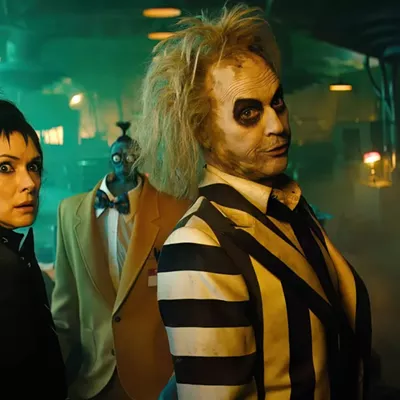Substance’s pointed message trumps flawed ending
With The Substance, director Coralie Fargeat manages to do something genre classicists John Carpenter and David Cronenberg would never allow - letting the special effects she uses overwhelm the story and lessen its impact.
Which is a shame, as The Substance has a great deal
to say about sexism in the entertainment industry and by extension, society,
as well as the self-loathing it breeds in the women who fall victim to it. When
it’s addressing these issues head on, it’s firing on all cylinders and is
driven by a fierce performance from Demi Moore, who’s obviously drawing on her
own experiences dealing with the vagaries of Hollywood and its attitude of
disposability where actresses are concerned. Fargeat’s agenda is obvious, yet
expressed pointedly with a liberal dose of dark humor. Ultimately, things spin
wildly out of control during a seemingly never-ending climax that proves
redundant and unnecessary.
Former actress Elisabeth Sparkle (Moore) has parlayed her
fame and fortune into a second career as a fitness instructor, her syndicated
exercise show seen by millions each day. Or at least, that’s how it once was.
With her ratings in decline, the show’s producer, Harvey (Dennis Quaid),
unceremoniously dumps her and begins searching for a younger replacement.
Soon after, Sparkle is involved in a car accident that sends
her to the hospital where she crosses paths with a nurse who gives her a phone
number, stating she’s a good candidate for a program that will change her life.
Desperate, she makes a call that will have dire consequences. After making a visit
to a wonderfully sketchy Los Angeles back alley, she’s given a regime of
injections and dietary supplements that will supposedly allow her to regain her
youth.
The result is a hybrid of Dr. Jekyll and Mr. Hyde and
The Picture of Dorian Gray, as ingesting the mysterious substance
results in a Faustian bargain. Generated from her own cellular matrix, a
younger version of Sparkle appears in the form of Sue (Margaret Qualley), who’s
everything she once was. She’s able to walk about for seven days while the
older version lies in stasis for a week.
Then, it’s necessary that they change places for the same amount of time.
This one week on, one week off situation allows Sue to get Sparkle’s old job
and become an overnight sensation.
However, the toll this ultimately takes on her host proves tragic.
The body horror that ensues occurs gradually, yet as the
parasitic nature of the relationship increases, Sparkle’s appearance becomes
increasingly grotesque. However, what’s most intriguing is the effect on her
psyche. Each time she looks in the mirror, her insecurities grow, Moore digging
deep during these moments, the pain in her eyes increasing with each successive
scene. During a sequence in which, while preparing for a date, she repeatedly
does and redoes her makeup, as well as change her outfit, the actress becomes
more and more frantic. Sparkle is incapable of seeing how beautiful she truly
is, magnifying every small flaw in her mind, overlooking each of her assets.
It’s a remarkable moment, one that was likely cathartic for the actress.
In putting the notion of the male gaze under the microscope,
Fargeat exposes those who would perpetuate it for the chauvinistic monsters
they are. (It’s no coincidence Quaid’s character is named Harvey) Yet, the
more vital point is looking at the result on those it is continually used upon.
The ultimate outcome of the Sparkle/Sue experiment is the personification of
the self-loathing so many women fall victim to. Once her true self is revealed,
it’s a horrific, poignant moment, a brilliant culmination of the director’s
theme. Thankfully, it and all that has
led up to it is enough to negate the unfortunate extremes Fargeat resorts to in
the film’s final 20 minutes. In heaters.
Strong scripts, brilliant Farrell allow Penguin to soar
Serving as a bridge between Matt Reeves’ 2022 hit The Batman and the upcoming sequel, The Penguin is a retro-origin story for one of the Caped Crusader’s seminal rogues. As was done with The Riddler in the first feature, this take on Oswald Cobb is grounded in reality, taking a deep dive into his tragic background in an effort to explain his aberrant behavior. There’s not a trick umbrella or trained penguin in sight, as we witness this damaged man attempt to gain control over a city that has ignored and abused him.
As envisioned by director Craig Zobel and writer Lauren
LeFranc, who both serve as producers for the series, the story takes a
psychological approach to the character, casting him as a victim of bullies and
ridicule, thanks in large part to his clubfoot which causes him to waddle like
the arctic bird, making him an object of derision.
He comes to represent those who live in Gotham’ impoverished
neighborhoods, which have been left in shambles, thanks to the Riddler’s
destruction of the seawall that protected it. As those who live there struggle
to start a new life, Cobb (a brilliant Colin Farrell) senses a vacuum in the
hierarchy of the city’s criminal underworld and makes move to fill it. Amoral
to the core, he cheats, steals, lies and kills in his mad grab at power,
actions that ultimately exact a tragic price.
Zobel and LeFranc have a great deal of confidence in their
story, as the first four episodes take their time introducing a new roster of
characters while familiarizing us with the intricate way in which they relate.
As such, having seen The Batman is not a requirement to enter this dark, dank
world.
In addition to Cobb, there’s Victor (Rhenzy Feliz), a
Dickensian street waif who’s shaped to be the villain’s confidante; Sofia Falcone
(Cristin Milioti), daughter of the now-vanquished boss Carmine, who’s making
her own moves to attain power; Salvatore Maroni (Clancy Brown), an imprisoned
rival boss, eager to escape and lord over Gotham; and Dr. Julian Rush (Theo
Rossi), Falcone’s therapist, who has a devious agenda of his own.
As these characters manipulate one another like pieces on a
chessboard, we’re privy to flashbacks that recount Cobb’s childhood, one in
which he is forever in the shadow of his two older, able-bodied brothers. His
efforts to gain his mother’s love as well as to be considered as more than just
a joke is what drives him. The flip side of the coin is Falcone, who we also
see as a child. She too is eager to please, but her father never gives her the
respect she deserves because of her sex. He ultimately disowns her in a way
that is unforgivable.
Though the other characters aren’t fleshed out as completely
as these two, many are given compelling backstories which elicit our sympathy
and interest. This is not the usual comic book fodder, as the series is more
interested in exploring just what makes these characters tick than seeing them
in acts of derring-do. This is never done so that we will sympathize with them,
but rather come to understand their psychosis.
As such, they’re relatable in ways that those who don capes often
aren’t, The Penguin being a dark, fascinating examination of human
behavior and the forces that shape it. Streaming on HBO MAX.
Strong performances central to Daughters success
We often kid ourselves into thinking that “keeping the peace” is the way to go where interpersonal issues are concerned. Whether it be a marriage or familial relationships, avoidance is the easier path to travel. Who wants to bring anything up that might ruin a family get-together? And after a rough day, when I just want to have dinner and check out in front of the TV, do I really want to mention that thing that’s bothering me with my wife?
Our reluctance to discuss concerns of this nature always
come back to haunt us, as they do the sisters in Azazel Jacobs His Three
Daughters, a chamber piece in which the titular characters have gathered in
a tiny New York City apartment, anticipating their father’s death. Smartly
written, the drama benefits greatly from the sharp performances from its
veteran cast as well a realistic sense of place that ultimately impacts its
flawed, relatable trio.
Vincent’s (Jay O. Sanders) health has been in decline for
quite some time, resulting in his having in-home hospice care. His oldest
daughter, Katie (Carrie Coon), has come to help him during what will likely be
his final days. In reality, she’s there to complain and cast herself as a
victim, which is what she’s always done. Harping on the fact that her father
did not sign a Do Not Resuscitate order and myriad other slights, the thinly
veiled barbs she continually fires off at Rachel (Natasha Lyonne), her
stepsister, become more and more pointed as each day passes.
As for Rachel, she’s shared the apartment with her father
for years, looking after him daily, watching him slowly fade away. That Katie
only lives one borough away and rarely comes to help out is conveniently
overlooked by the elder sibling. The long-simmering resentment between them
only increases as the days slowly go by. Rachel soon finds herself a prisoner
in her own home, retreating to her bedroom to avoid any confrontations.
Christina (Elizabeth Olson) is the one caught in the middle,
the sister who got away, having married, gone to California and started a
family. She constantly mentions how
wonderful her life is yet laments the frantic pace of being a modern mother,
complaints that seem insignificant to her sisters. At times, she seems to be a
step behind her sisters, her way of coping with stress not as overt as theirs.
Though the film lags in the middle, for the most part
Jacobs’ pacing is spot on, the tension between the three steadily building
until the inevitable emotional explosion occurs. The director’s script is
grounded, each of the sisters displaying recognizable character traits. You’ll
be able to equate each these women with people you know in your life, their
behaviors typical of this sort of dynamic.
An unnecessary narrative device is used in the third act
that proves to be a distraction. It’s as if Jacobs has a
momentarily lapse in judgement regarding the quality of his work. He need not
have worried; his casting saves the day as the three principal actresses give
some of the best performances of the year.
Streaming on Netflix.





















